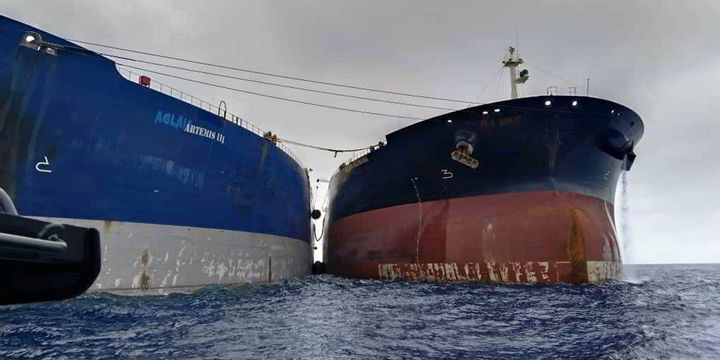In what increasingly looks like an oblique way to discourage Russian oil transfers directly off its coast, Greece on Thursday extended a shutdown of the Laconian Gulf — a notorious ship-to-ship (STS) hotspot — for another 10 days.
A NAVTEX guidance discouraging commercial ship traffic in the area that was originally supposed to last between 1 May and 9 May has been renewed for another 10 days until the afternoon of 19 May, according to a message on the website of the Hellenic Navy Hydrographic Service.
The sheltered Laconian Gulf has always been a key spot for Russian crude transfers, as large VLCCs are not able to cross into the Black Sea.
Such transfers have been taking place for decades but are frowned upon and generated negative media attention since the West imposed sanctions on Russian oil following that country’s invasion of Ukraine.
Even though Greek officials have not made any public statements to that effect, naval exercises have been interpreted as an indirect way to push the transfers further out into international waters to save Athens an embarrassment.
Any tanker dispersals, however, are likely to be temporary, shipbroker BRS said in a note earlier this week.
Article continues below the advert
Even if Greek obstacles in the Laconian Gulf persist, a new opportunity for STS crude transfers may be opening up in different waters.
According to Bloomberg, the first such operation was recorded in the Red Sea towards the end of April.
In the past, similar transfers used to take place in Greece’s Messenian Gulf as well but largely stopped after Greece — in a move unrelated to Russian oil sanctions that took place three years ago — extended its territorial waters there to 12 nautical miles.
That territorial water extension, however, does not extend to the Laconian Gulf — which is just to the east of the Messenian Gulf — because Greece only extended that part of its territorial waters facing west, towards Italy.
Greece’s eastern waters, by contrast, continue to stretch out just six nautical miles off the country’s coast.
The government in Athens has been saying for decades that it reserves the right to extend its eastern waters to 12 miles as well, but has refrained from doing so to avoid confrontation with its Aegean neighbour Turkey.
Ankara vehemently opposes a 12-mile extension in the Aegean, to the point of formally threatening Greece with war if it happens.

